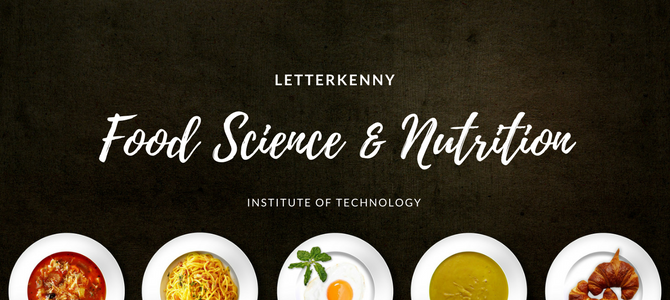Jo Ezer Lau tells us more about his course and shares a day in his life as a Food Science & Nutrition student at the Letterkenny Institute of Technology…
Having completed the International Baccalaureate Diploma Programme back in Malaysia prior to studying in Ireland, the first year of the Food Science and Nutrition programme at Letterkenny Institute of Technology was a stroll in the park. This second year nonetheless, I’d like to think, has been a stroll too… through Jurassic Park.
The course kicked off with five modules in the first two semesters – Biology, Chemistry, Physics, Mathematics, and Transferable Skills. In the second year, there has been a clear shift in the overall focus of the programme through modules with greater relevance to the food industry, e.g. Food Technology, Food Instrumentation, Data Methods for Science, and Biochemistry.
The laboratories are modern and well-stocked with excellent lab equipment in place in accordance with the course requirements. The cherry on the cake, though, is the group of high calibre lecturers in the Science department.
Food Instrumentation has been proportionally more demanding in reading around the subject and piecing information from the text with the lecture content, and simply applying the understanding of analytical methods – with the likes of spectroscopy, potentiometry and conductometry among many others – to the actual laboratory practical sessions. Perhaps, the practicality of this module and how it translates into essential technical skills needed in the food industry compounds the academic pressure. Yet, the core element of a hands-on, technical learning experience at an Institute of Technology provides an extraordinary career head-start, a privilege that I’m definitely proud of and grateful for at Letterkenny IT. From here on out, it only gets more exciting and interesting with future modules in store such as Human and Sports Nutrition, Fermentation, Food Chemistry, Quality Management, Food Safety, Product Development and Sensory Evaluation, just to name a few!
The laboratories are modern and well-stocked with excellent lab equipment in place in accordance with the course requirements. The cherry on the cake though is the group of high calibre lecturers in the LYIT Science Department. They have worked in various sectors of the food industry for a significant number of years, and are involved in ongoing research projects. With this holistic experience that complements their profession, they bring so much to the table in terms of building us up for the future and equipping us with adequate career skill sets. As a student, my confidence in the course they have collaboratively designed is ever-increasing. The range of topics delved into; the moments the jigsaw pieces fitted; the number of times bulbs have been lit up – reflecting on the demanding workload this semester and the extent to which I’ve developed my understanding in this field where I believe my passion lies the more I realise, that this is merely the tip of the iceberg.
The cherry on the cake though is the group of high calibre lecturers in the LYIT Science Department. They have worked in various sectors of the food industry for a significant number of years, and are involved in ongoing research projects.
In this journey of self-discovery through an academic lens, my biggest takeaway is that I find myself being part of the Dunning Kruger effect. In the words of Michael Stevens from Vsauce, in his video “What is the speed of dark?”, “the more you learn about something, the more you realise just how rich, complex, overwhelming, and full of, as of yet, unanswered questions it really is.” Irish playwright and polemicist, George Bernard Shaw, once toasted Albert Einstein, jesting that Science seems wrong because it never solves a problem without creating ten more. Einstein agreed, using geometry to illustrate how, as our circle of knowledge grows, so does the circumference of darkness surrounding it, but faster – showing just how ‘in the dark’ we are while ‘shedding light’. Phillipe Verdoux’s “enlightenment leads to benightedness, science entails nescience” rightly paints the bigger picture. Undoubtedly, it is the paradoxical mantra I have indelibly etched on my heart as the driving force in the pursuit and application of multidisciplinary knowledge, in the Food Science and Nutrition programme and beyond.

